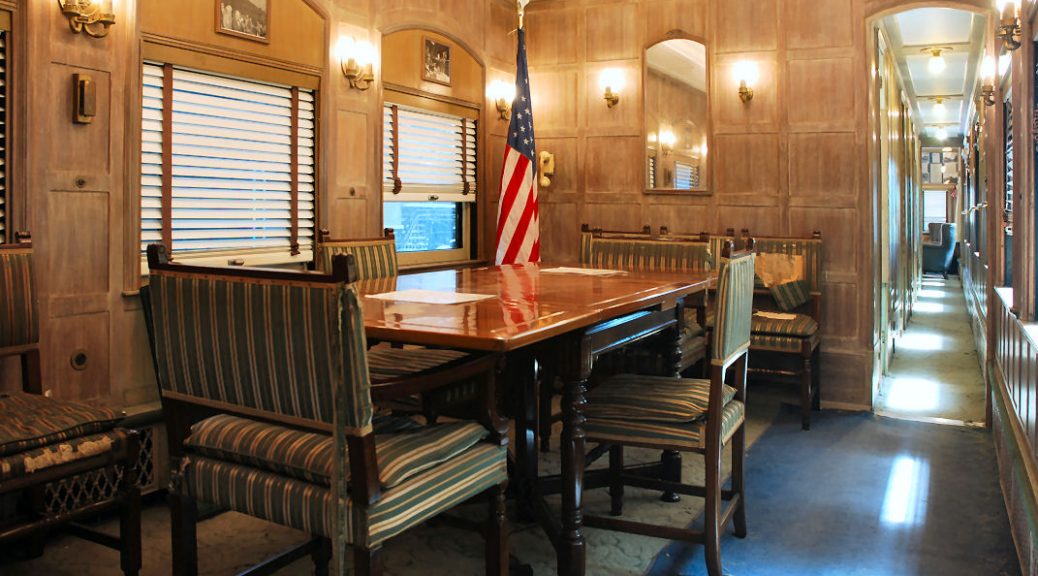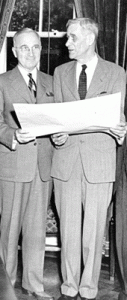
Churchill, Truman and Poker on the Train to Fulton, March 1946
How Harry fleeced Winston at poker, and the PM wished to be born again…
The Hillsdale College Churchill Project is closing in on finishing Winston S. Churchill, the official biography. At thirty-one volumes, it is the longest on record and will have taken fifty-six years to complete. It is an honor to be part of the team now reviewing proofs for the penultimate document (companion) volume. This runs from August 1945, after Churchill was turned out of office, through September 1951, when he was about to regain it. The last volume (1951-65) will be published next year, with suitable celebrations.
One of the joys of this work is the vast trove of hitherto undiscovered (or at least obscure) facts it provides. Take the 1945-51 volume, for example. One has no concept of the extent and collegial communication, after the July 1945 election, between Churchill and Clement Attlee. Labour had routed the Conservatives. Churchill was embittered over his dismissal, and conventional wisdom is that they were at daggers-drawn. Not so. Churchill and Attlee went out of their way to communicate. Even when they disagreed on issues, they respectfully wrote and met with each other. That was indeed a different age.
Above all, they tried to maintain a united front in British foreign policy as the Cold War accelerated. Churchill’s alleged cracks about Attlee— “an empty taxi arrived and Clem got out”; a “sheep in sheep’s clothing”—are apocryphal. Churchill made only one remark at Attlee’s expense. It was in private, and it is in this volume. It occurred as he and President Truman rode to Fulton for the “Iron Curtain” speech aboard the Ferdinand Magellan, “U.S. Railcar No. 1.”
All Aboard!
This volume exhaustively covers Churchill’s invitation to speak at Fulton, Truman’s support for it, Churchill’s visit to America, and every aspect of the event down to who was assigned to which car on the Presidential train. One was Clark Clifford who worked for Democrat presidents from Truman to Carter and served briefly as Lyndon Johnson‘s Secretary of Defense. Aged only forty in 1946, he was White House counsel to the President. His recollections were published in the St. Louis Post-Dispatch. Before he died he sent them to me with permission to use for any educational purpose. They are among the few additions I could offer to this volume, so masterfully assembled by Martin Gilbert and Hillsdale’s Churchill fellows. It is in Clifford’s recollection that Churchill committed a momentary lapse in his usual respectful references to Attlee.
The Magellan, Clifford wrote:
had an observation platform on the back and it was equipped so that in the rear portion you walked into a very attractive living room, furnished as you might furnish a men’s club. There was a series of closed-in staterooms with separate baths, and at the other end of the car, there was a dining room and what the Navy would call a galley. So those two lived on that car and the rest of us lived on the car in front, which was a standard Pullman. The reason they went by train was to give Churchill and Truman an ample opportunity to talk. Mr. Truman wanted the opportunity to visit with Churchill, and Churchill, who had been very close to Franklin Roosevelt, felt he had no relationship with Truman and wanted to develop one.
* * *
We left Washington around noon, and we all sat down in the living room. Mr. Churchill said, “Mr. President, we’re going to be together now for a week or so. I would like to dispense with formality, and to have the privilege of calling you Harry.” And Truman said, “Mr. Churchill, I would be honored if you would call me Harry.”
Then Mr. Churchill said, “Well, if I am going to call you Harry, then you must call me Winston.” Mr. Truman, as you know, was a very modest fellow, so he said, “That would be very difficult for me to do, Mr. Churchill. I have such a high regard and enormous respect for you.” But Churchill said, “You must do it, or I can’t call you Harry.” And Mr. Truman said, “All right, then. It’s Harry and Winston.”
The next thing Truman said was, “About six weeks ago, Clement Attlee came over to see me.” There was a very chill silence. Then Churchill said, “There is less there than meets the eye.” Mr. Truman, knowing that he’d kind of put his foot in it, just bravely felt he had to go on. So he said. “Well, he seems to be a very modest fellow.” “Yes,” Churchill said, “He has much to be modest about.”
“If I were to be born again…”
It was “a great deal of fun,” Clifford continued, because “Churchill punctuated the conversation with philosophical musings.” He remembered only one, but in Harry Truman’s vernacular, it was a humdinger. Until Mr. Clifford’s testimony, it was hard to believe Churchill said it:
One evening, we stayed up late. Everybody else went to bed, and [Truman Press Secretary] Charlie Ross and I stayed up and talked to him afterwards. He was kind of mellow by that time. He had the reputation of being a fairly formidable drinker, and I think I know the reason why. It was because he always had a scotch highball in front of him, but he would nurse the highball, and it would take him about an hour and a half to drink it. I did not find him to be a heavy drinker at all.
This evening, he said, “If I were to be born again, I would wish to be born in the United States. At one time it was said that the sun never sets on the British Empire. Those days are gone. The United States has the natural resources; they have an energetic, resilient people. The United States is the hope of the future. Even though I deplore some of your customs. You stop drinking with your meals.”
* * *
For the archetypal Englishman, with such reverence for his country, this seems astonishing. And yet as you think about it, it becomes easier to believe. Britain after two world wars was exhausted and broke. Churchill knew it—knew it first hand. His documents are full of his depression over Britain’s plight. Yet he had this overwhelming respect and faith in what he always called “my mother’s land.” He saw in “the Great Republic” the hope of the world.
Poker

Without leaking the full contents of the Clifford document, I can’t resist some of the poker bits. The story is redolent of Churchill and Truman humor, their ripening friendship as the train rumbled on. Clark Clifford continues:
Churchill said, “Harry, I’ve read in the press over a period of years that you play poker.” And Truman said, “Yes, I guess I’ve played poker for a good many years, Winston.” Then Churchill proudly said, “Well, I first learned to play poker in the Boer War. I love the game.” Well, my God, that was very impressive; none of us could remember when the hell the Boer War was.
* * *
We played dealer’s choice: stud, draw, seven-card stud and high-low, which is a great gambling game because it keeps everybody in the pot. Well, we played about an hour and a half, and Mr. Churchill excused himself to go to the men’s room. And the President looked over to his staff and counsellors and said, “Men, Mr. Churchill has lost $850. Now, remember, he is our guest. We certainly are not treating him very well.”
Charlie Ross spoke up, and said, “Boss, you can’t have it both ways. Which do you want us to do, play poker or carry this fellow along?”
The President said, “Boys, I want Mr. Churchill to have a good time. I recognize the standards of poker as played in Great Britain aren’t nearly up to the standards in the United States. But I want him to have a lovely time.”
So he was nursed along, and he won some wonderful big pots. I saw some people drop out with three aces, and he’d win with a pair of kings. He had a marvelous time, and yet he couldn’t go back and say he’d beaten this group playing poker. When the last game was over he’d lost about $80.
The occasion was the opportunity of a lifetime. Here we were, encapsulated in this railroad car, having meals during the day and the poker at night. I don’t know anybody else who had the opportunity of spending that kind of time with Mr. Churchill.







3 thoughts on “Churchill, Truman and Poker on the Train to Fulton, March 1946”
Utter rubbish. The wording doesn’t even sound like Churchill. This is pure fiction made up by the same mindsets that created the quote about fighting Germany regardless of who was in charge. Scroll to “Germany” on this post.
I read this quote, seemingly said by Churchill to Truman during March 1946 at Fulton, but can’t find the source. Is it valid?
“The war wasn’t only about abolishing fascism, but to conquer sales markets. We could have, if we had intended to, prevented this war from breaking out without doing one shot, but we didn’t want to.”
great stories. Poker is a fun game but unless you play it often you can’t really play with the boys. I had not realized Churchill lost $80.
Comments are closed.